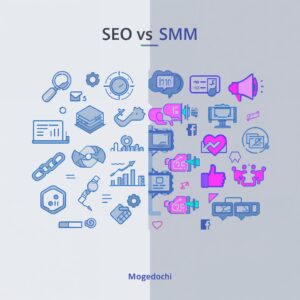SEO vs SMM: How They Influence Search Engine Rankings

In today’s digital-first world, a brand’s success heavily depends on its online visibility. Two of the most effective strategies to strengthen this visibility are SEO vs SMM. Understanding how each of these impacts search engine rankings allows businesses, including digital marketing companies in Delhi, to refine their online strategies and attract more clients.
SEO and SMM at a Glance

Search Engine Optimization (SEO):
SEO focuses on improving a website’s position on search engine results pages (SERPs). By targeting the right keywords, earning backlinks, and optimizing technical elements, businesses can rank higher on Google and other search engines. The ultimate goal is to enhance organic visibility and drive consistent traffic.
Social Media Marketing (SMM):
SMM involves leveraging platforms like Facebook, Instagram, Twitter, and LinkedIn to promote a brand, engage with customers, and funnel traffic to a company’s website. Common tactics include creating engaging content, running paid ads, and collaborating with influencers. While SMM doesn’t directly determine search rankings, it amplifies brand exposure and audience engagement, indirectly supporting SEO efforts.

How SEO Directly Affects Rankings
-
Keyword Optimization: Using the right keywords (e.g., digital marketing services in Delhi) in titles, headers, meta descriptions, and content helps Google understand a page’s relevance.
-
Quality Content: Publishing unique, informative, and user-focused content improves a site’s authority and visibility.
-
Backlinks: Links from reputable websites signal trustworthiness and improve ranking.
-
Technical SEO: Factors like site speed, mobile responsiveness, HTTPS security, and structured navigation ensure a positive browsing experience—something search engines reward.
-
User Experience (UX): A site that’s easy to explore, well-designed, and user-friendly keeps visitors engaged, boosting SEO metrics.
How SMM Indirectly Influences Rankings
-
Traffic Generation: Social media helps attract visitors to a site, which can signal relevance to search engines.
-
Content Sharing: Viral or widely shared content increases reach and visibility outside the website.
-
Brand Awareness & Trust: A strong social presence improves recognition and credibility, driving more branded searches on Google.
-
Social Signals: While likes, comments, and shares aren’t direct ranking factors, high engagement shows that content is valuable, indirectly benefiting SEO.
-
User-Generated Content: Customer reviews, mentions, and shares often lead to more backlinks and strengthen SEO campaigns.
Combining SEO and SMM for Better Results
For digital marketing companies in Delhi, the real power lies in integrating both strategies:
-
Unified Content Plan: Create content that’s optimized for search while also being engaging and shareable on social platforms.
-
Cross-Promotion: Share blogs and web content across social media to drive organic traffic and visibility.
-
Work with Influencers: Collaborations expand brand reach, bring in new audiences, and boost website authority through traffic.
-
Analytics & Monitoring: Use tools to track the combined performance of SEO and SMM efforts, making data-driven improvements.
-
Consistency: Long-term success comes from regularly updating content, engaging audiences, and adapting to search and social algorithm changes.
Conclusion
SEO vs SMM play different yet complementary roles in digital marketing. SEO directly influences search rankings through content quality, keywords, and technical optimization, while SMM drives audience engagement, brand awareness, and indirect traffic signals.
When businesses combine both strategies, they build a stronger, more resilient online presence—gaining more visitors, improving brand credibility, and achieving higher rankings in the long run. The synergy between SEO vs SMM ultimately ensures sustained growth and digital success.

Frequently Asked Questions (FAQs)
Q1. What is the difference between SEO vs SMM?
SEO focuses on improving a website’s ranking on search engines through keywords, content, backlinks, and technical optimization, while SMM promotes a brand through social media platforms to increase visibility, engagement, and traffic.
Q2. Does social media marketing (SMM) affect SEO rankings?
SMM does not directly impact rankings but can indirectly boost SEO by driving website traffic, increasing brand mentions, generating backlinks, and improving audience engagement.
Q3. How does SEO benefit businesses in Delhi?
For Delhi-based businesses, SEO helps attract local customers by targeting location-specific keywords, appearing in local search results, and building credibility with organic visibility.
Q4. Why should businesses integrate SEO vs SMM strategies?
When combined, SEO vs SMM create a powerful digital strategy—SEO improves search visibility, while SMM boosts content reach and brand engagement, resulting in higher traffic and stronger rankings.
Q5. How long does it take to see results from SEO vs SMM?
SEO is a long-term strategy that may take 3–6 months for noticeable results, while SMM campaigns can generate quicker engagement. Together, they ensure sustained growth.

